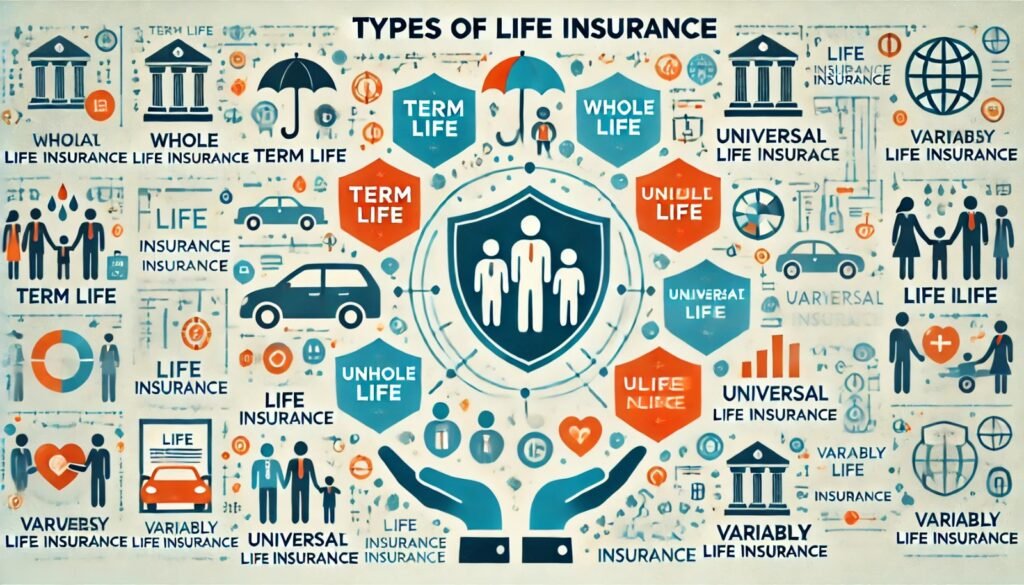In today’s unpredictable world, ensuring the financial security of your loved ones has never been more important. With rising expenses and uncertain economic conditions, protecting your family’s future is a priority that cannot be overlooked.
Life insurance plays a vital role in safeguarding your family’s financial well-being, providing a safety net in case the unexpected happens. It’s more than just a policy; it’s a commitment to your family’s future. By investing in life insurance, you’re securing not only peace of mind but also the assurance that your loved ones will be taken care of, no matter what.
Whether you’re considering term life insurance, whole life insurance, or universal life insurance, each policy type offers unique benefits that cater to different needs. Term life insurance provides coverage for a specific period, offering affordability and straightforward protection. Whole life insurance, on the other hand, combines lifelong coverage with a cash value component, making it an appealing choice for those looking to build wealth. Universal life insurance offers flexibility in premium payments and death benefits, allowing you to adjust your policy as your needs change.
Understanding Life Insurance
What is Life Insurance?
Life insurance is a contract between an individual and an insurance company where the insurer agrees to pay a designated amount of money to the policyholder’s beneficiaries upon their death. In exchange, the policyholder pays regular insurance premiums to maintain the policy. This arrangement provides a crucial financial safety net for families, ensuring that their financial needs are met even in the absence of the primary breadwinner.
A life insurance policy serves as a form of protection that helps to cover essential expenses such as mortgage payments, children’s education, and daily living costs. With adequate life insurance coverage, families can avoid financial hardship and maintain their standard of living during a challenging time. It’s a tool that not only provides peace of mind but also ensures that your loved ones are financially secure when they need it most.

Types of Life Insurance
When it comes to life insurance, there are several types to choose from, each designed to cater to different needs and financial situations. The three main types of life insurance are term life insurance, whole life insurance, and universal life insurance. Understanding the differences between these policies can help you make an informed decision that aligns with your family’s needs.
Term life insurance is the most straightforward and affordable option, providing coverage for a specific period, typically 10, 20, or 30 years. It’s an ideal choice for those seeking temporary coverage, such as parents wanting to secure their children’s future until they become financially independent. If the policyholder passes away during the term, the beneficiaries receive the death benefit. However, if the term expires and the policyholder is still alive, the coverage ends without any payout.
Whole life insurance:
on the other hand, offers lifelong coverage combined with a cash value component. This policy not only provides a guaranteed death benefit but also allows the policyholder to accumulate savings over time. The cash value grows tax-deferred and can be borrowed against or withdrawn during the policyholder’s lifetime. This makes whole life insurance an attractive option for those looking to build wealth while ensuring their family’s financial security.
Universal life insurance
provides flexibility in both premium payments and death benefits. Policyholders can adjust their premiums and death benefits as their financial needs change over time. This type of insurance also includes a cash value component that earns interest based on the performance of the insurance company’s investments. Universal life insurance is well-suited for individuals seeking a customizable policy that can adapt to their evolving financial situation.
Why Every Family Needs Life Insurance
Protecting Your Loved Ones
The primary purpose of life insurance is to ensure that your loved ones are taken care of financially in the event of your passing. One of the key benefits of a life insurance policy is the death benefit, which is the amount paid out to your designated insurance beneficiary upon your death. This money can be used to cover a variety of expenses, such as funeral costs, outstanding debts, and ongoing living expenses, providing your family with the financial support they need during a difficult time.
Life insurance is not just for young families; it’s also essential for life insurance for seniors who want to leave a legacy or ensure that their spouse and dependents are financially secure.
Financial Stability in Difficult Times
Life is unpredictable, and unexpected events like the death of a breadwinner can leave a family in financial turmoil. A life insurance policy provides a critical safety net by delivering a life insurance payout that can be used to cover immediate needs and maintain the family’s standard of living. This payout ensures that your family can continue to meet their financial obligations, such as mortgage payments, utility bills, and daily expenses, even in the face of loss.
Regular insurance premium payments make it possible for your family to receive this financial support when they need it most. In addition to basic life insurance, you can also consider adding supplemental life insurance for extra coverage. This can provide an additional layer of protection, ensuring that your family’s financial stability is maintained no matter what challenges they face.
Long-Term Financial Planning
Life insurance is not just about providing for immediate needs; it can also play a vital role in your long-term financial planning. Policies like cash value life insurance offer both a death benefit and a savings component that grows over time. The cash value can be accessed during your lifetime for various purposes, such as funding your children’s education, supplementing your retirement income, or investing in other financial opportunities.
Moreover, life insurance can be integrated into an insurance trust, allowing you to manage how the death benefit is distributed to your beneficiaries. This can be particularly beneficial in estate planning, ensuring that your assets are passed on according to your wishes. For those seeking lifelong coverage, permanent life insurance is an excellent option.
How to Choose the Right Life Insurance for Your Family
Assessing Your Family’s Needs
Choosing the right life insurance policy begins with a thorough assessment of your family’s life insurance needs. The first step is to determine the amount of coverage required to secure your family’s financial future. This involves considering factors such as your current income, outstanding debts, mortgage, daily living expenses, and future financial goals, such as your children’s education and retirement plans.
To simplify this process, you can use a life insurance calculator, which helps you estimate the amount of coverage needed based on your financial situation. These calculators take into account various factors, including your current financial obligations and expected future expenses, to provide a more accurate estimate of your life insurance needs. By understanding the level of coverage required, you can make an informed decision on the type and amount of life insurance that best suits your family.
Finding the Best Life Insurance Policy
After assessing your needs, the next step is to find the most suitable life insurance policy for your family. Start by obtaining life insurance quotes from multiple insurers. These quotes will give you an idea of the cost of coverage and help you identify affordable life insurance options that fit within your budget. It’s important to compare the life insurance rates from different companies, as premiums can vary significantly based on factors such as age, health, lifestyle, and the type of policy you choose.
When comparing policies, pay attention to the details of the coverage, including the length of the term (for term life insurance), the cash value component (for whole or universal life insurance), and any additional features or riders that can be added to the policy.
Working with Insurance Agents and Companies
Navigating the complexities of life insurance can be challenging, which is why working with experienced insurance agents can be incredibly beneficial. An insurance agent can guide you through the process, helping you understand the different types of policies available and how they align with your family’s needs. They can also assist in obtaining quotes, comparing policies, and explaining the terms and conditions of each option.
Common Myths About Life Insurance
Debunking Misconceptions
Life insurance is often misunderstood, leading to several common myths that can deter people from purchasing a policy. One of the most widespread misconceptions is that life insurance is too expensive. While it’s true that costs can vary, many people overestimate the insurance cost. In reality, there are numerous affordable options available, especially when you consider the protection it provides for your family’s future.
Another common myth is that life insurance is overly complex and difficult to understand. While life insurance policy terms can be detailed, they are designed to ensure clarity and protection for both the insurer and the insured.
FAQ
How do you secure your family’s financial future?
Securing your family’s financial future involves planning and taking proactive steps to protect and grow your assets. Key actions include purchasing a comprehensive life insurance policy, creating a budget, saving for emergencies, investing wisely, and planning for retirement. By ensuring that you have adequate life insurance coverage, you provide a safety net for your loved ones, ensuring they can maintain their standard of living even in your absence.
What does secure your future mean?
Securing your future means taking measures to ensure financial stability and peace of mind for yourself and your loved ones. It involves planning for unforeseen events, such as illness or death, and making sure you have the resources to handle life’s uncertainties. This often includes setting up a life insurance policy, saving and investing wisely, and preparing for retirement.
What does it mean to secure your financial future?
Securing your financial future means creating a plan that ensures you have the necessary financial resources to meet your long-term goals and handle unexpected expenses. This includes building an emergency fund, investing for growth, planning for retirement, and obtaining life insurance to protect your loved ones in case of unforeseen events. It’s about making sure you and your family are financially stable now and in the future.
How do you secure a successful future?
Securing a successful future involves setting clear goals and taking consistent steps to achieve them. Financially, this means budgeting, saving, investing, and ensuring you have adequate protection through life insurance. Education, career planning, and personal development are also crucial elements. By combining financial planning with personal and professional growth, you can build a foundation for a successful and secure future.
How do you build a secure financial future?
Building a secure financial future requires a balanced approach that includes saving, investing, managing debt, and protecting your income and assets with life insurance. Start by setting financial goals, such as buying a home, funding education, or retiring comfortably.

